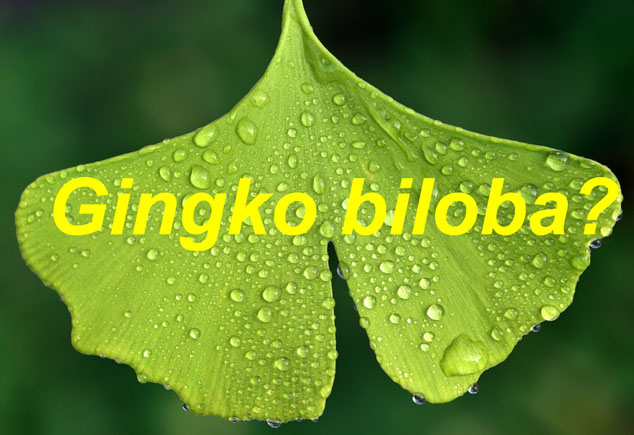 Yes, of course, Ginkgo biloba is the correct spelling of the scientific name for the Maidenhair Tree.
Yes, of course, Ginkgo biloba is the correct spelling of the scientific name for the Maidenhair Tree.
Unfortunately, it appears incorrectly on way too many supplement labels.
Such errors appear most commonly in multi-herb products where Ginkgo biloba is one of the botanicals.
And it’s not alone. A cursory (meaning, unscientific) look-see of any set of herb-containing supplements will find many incorrect names.
Misspellings are the easiest to fix.
A bigger challenge rests on citing the correct species in the first place.
Is this an important issue?
Yes, if integrity is important.
What’s in a Name?
Listing the wrong species of Ginkgo is not likely. Ginkgo biloba is the only species in the family Ginkgoaceae, which is the only family in the order Ginkgoales.
In contrast, it’s not so easy when it comes to, say, ginseng.
That common name is associated with at least twelve different species from six different genera.
Their ginsenoside profiles vary, which means their benefits vary.
Using the correct scientific name is crucial for communicating the right source of ginsenosides.
Fundamentally, citing the correct species name on a supplement label is the basis for knowing what to expect from a product. It’s pretty straightforward.
It’s not so easy with all herbs. Taxonomically, they can be a mess.
The benefits of cinnamon, for example, are confounded by published studies lacking clear identification of botanical sources.
Ultimately, supplement manufacturers must choose the correct species names on their nutraceutical labels.
Doing so reflects the effort to ensure product quality.
And, in the age of increasingly savvy customers, quality reigns more than ever.
Addressing the Scope
As a professional plant taxonomist myself, I can appreciate the scope of challenges in citing correct species names.
Somewhere north of 400,000 plant species names have been accepted according to the International Code of Botanical Nomenclature. Old or unaccepted names can double or triple that number.
Furthermore, it’s a dynamic list. Taxonomists propose about 4,000 new plant names or name changes every year.
Cultivars and hybrids gum up the name game even further.
That’s just one kingdom of life.
Two other kingdoms that often provide supplement ingredients – bacteria and fungi – create further demand to pay attention to proper scientific nomenclature.
Probiotics comprise a list of who’s who for something called ‘strains’. Manufacturers must not only provide species binomials, they must also cite the appropriate strains.
Likewise for mushrooms. Of the 14 most common medical mushrooms, many have multiple ‘types’. Reishi alone consists of six different types in nature.
The solution?
It’s simple:
1) Either make sure you have a taxonomic expert on your staff.
2) Or hire one.
In both cases, preferably someone who has a track record of taxonomic publications in the scientific literature.
Barring that, at least some evidence of training or expertise in a taxonomic field.
Or, How About This?
Imagine a scientist with expertise both in taxonomy and in chemistry.
Such a scientist can really grease the skids for nailing down the right scientific nomenclature AND for matching a particular biological entity with its chemical literature.
Actually, you don’t have to imagine such a scenario.
That’s exactly what my professional background has been for more than 40 years.
Pretty cool, eh?
And that’s just for starters.
The thumbnail for the rest of my background looks like this:
A 30-year professor at a major research university. Dozens of publications in scientific journals. Co-author of a best-selling university-level textbook. A specialist in natural products chemistry. An experienced writer for B2B and B2C supplement companies.
If you see your company needing the services of someone like that, please feel free to contact me so we can talk about how I can help you.
Messaging here on LinkedIn works. So does direct email (drdennisclark@gmail.com).
Go ahead and give me a buzz to get our conversation started today.
References
Dauncey EA, Irving J, Allkin R, Robinson N. Common mistakes when using plant names and how to avoid them. Eur J Integr Med. 2016 Oct;8(5):597-601. https://www.ncbi.nlm.nih.gov/pmc/articles/PMC5646648/
Oketch-Rabah HA, Marles RJ, Brinckmann JA. Cinnamon and Cassia Nomenclature Confusion: A Challenge to the Applicability of Clinical Data. Clin Pharmacol Ther. 2018 Sep;104(3):435-445. https://pubmed.ncbi.nlm.nih.gov/29947417/
Rivera D, Allkin R, Obón C, Alcaraz F, Verpoorte R, Heinrich M. What is in a name? The need for accurate scientific nomenclature for plants. J Ethnopharmacol. 2014 Mar 28;152(3):393-402. https://pubmed.ncbi.nlm.nih.gov/24374235/
Leave a Reply